英语姓氏之趣谈
(11)欧美姓氏的来源
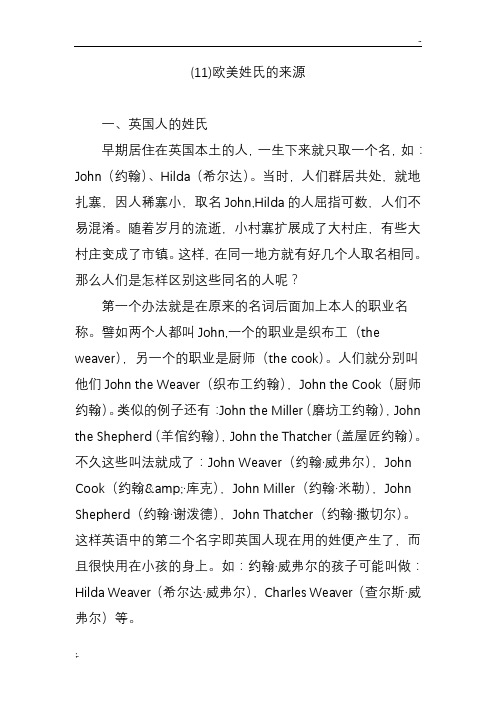
(11)欧美姓氏的来源一、英国人的姓氏早期居住在英国本土的人,一生下来就只取一个名,如:John(约翰)、Hilda(希尔达)。
当时,人们群居共处,就地扎寨,因人稀寨小,取名John,Hilda的人屈指可数,人们不易混淆。
随着岁月的流逝,小村寨扩展成了大村庄,有些大村庄变成了市镇。
这样,在同一地方就有好几个人取名相同。
那么人们是怎样区别这些同名的人呢?第一个办法就是在原来的名词后面加上本人的职业名称。
譬如两个人都叫John,一个的职业是织布工(the weaver),另一个的职业是厨师(the cook)。
人们就分别叫他们John the Weaver(织布工约翰),John the Cook(厨师约翰)。
类似的例子还有:John the Miller(磨坊工约翰),John the Shepherd(羊倌约翰),John the Thatcher(盖屋匠约翰)。
不久这些叫法就成了:John Weaver(约翰·威弗尔),John Cook(约翰&·库克),John Miller(约翰·米勒),John Shepherd(约翰·谢泼德),John Thatcher(约翰·撒切尔)。
这样英语中的第二个名字即英国人现在用的姓便产生了,而且很快用在小孩的身上。
如:约翰·威弗尔的孩子可能叫做:Hilda Weaver(希尔达·威弗尔),Charles Weaver(查尔斯·威弗尔)等。
古英语中有个名字叫Wright,原意是工人或制造者。
制造两轮马车的人叫cartwright,造车轮子的叫wheelwright、造船的叫shipwright。
英国人至今还使用许多类似Wright(赖特),Cartwright(卡特赖特)和Wainwright(韦恩赖特)的姓。
更为常见的姓是Smith(史密斯)。
英语中的smith一字原意是用金属材料制造东西的人,如:goldsmith(金匠),blacksmith(铁匠),tinsmith(锡匠),coppersmith(铜匠)。
英语姓氏 起源

英语姓氏的起源英语姓氏大全英语姓名的一般结构为:教名+自取名+姓。
如William Jafferson Clinton。
但在很多场合中间名往往略去不写,如George Bush,而且许多人更喜欢用昵称取代正式教名,如Bill Clinton。
上述教名和中间名又称个人名。
现将英语民族的个人名、昵称和姓氏介绍如下:I. 个人名字按照英语民族的习俗,一般在婴儿接受洗礼的时候,由牧师或父母亲朋为其取名,称为教名。
以后本人可以在取用第二个名字,排在教名之后。
英语个人名的来源大致有以下几种情况:1. 采用圣经、希腊罗马神话、古代名人或文学名著中的人名作为教名。
2. 采用祖先的籍贯,山川河流,鸟兽鱼虫,花卉树木等的名称作为教名。
3. 教名的不同异体。
4. 采用(小名)昵称。
5. 用构词技术制造新的教名,如倒序,合并。
6. 将母亲的娘家姓氏作为中间名。
英语民族常用的男子名有:James, John, David, Daniel, Michael, 常见的女子名为:Jane, Mary, Elizabeth, Ann, Sarah, Catherine.II. 昵称昵称包括爱称、略称和小名,是英语民族亲朋好友间常来表示亲切的称呼,是在教名的基础上派生出来的。
通常有如下情况:1. 保留首音节。
如Donald => Don, Timothy => Tim. 如果本名以元音开头,则可派生出以'N'打头的昵称,如:Edward => Ned.2. +ie 或-y 如:Don => Donnie, Tim => Timmy.3. 采用尾音节,如:Anthony => Tony, Beuben => Ben.4. 由一个教名派生出两个昵称,如:Andrew => Andy & Drew.5. 不规则派生法,如:William 的一个昵称是Bill.III. 姓氏英国人在很长的一段时间里只有名而没有姓。
英语国家社会习俗 第二章 姓氏习俗

例子
较典型的例子是长诗《贝尔武甫》(Beowulf)。 它是一部描写英雄与恶魔斗争的诗,被称为英 国民族的史诗。诗中出现的称谓 Beowulf, Hygelac(the king of the Geats), Hrothgar(the king of the Danes), Grendel(the monster), Ecgtheow(Beowulf’s father), Aechhere(the chief councillor of Hrothgar) 都是主要角色的名字。
第一节
姓氏起源
英语姓氏的起源有一段有趣的历史。从前人们 只有在刚出生时所起的一个名字。例如, 也许叫 约翰John, 也许叫希尔达Hilda。当人们像过去那 样几个人住在一起或者一些人住在一个小村庄 里时, 一个名字就足够了。如果有了提及Hilda或 者John, 村里的每上人都知道他指的是谁, 因为 在一个村子里仅有一个希尔达或一个约翰, 但是 随着时间的推移, 小村庄发展为大村庄, 一些大 村庄又发展为城镇。这样就可能有五六个约翰 或者五六个希尔达都住在相同的地方。那么人 们又怎样区分是哪个约翰, 哪个希尔达呢?
古英语的人名(公元5一10世纪)在很大程度上 反映出部族社会中流行的崇拜英雄、崇尚武力 的社会风气。很多名字的主题都与战争题材有 关: Garamond (=warrior protection), Ecgbeort(=sword bright), Cuthfgar(=famous Protection), Gunnhild(=battle war), Wulfgar(=wolf warrior), Hwitheard (=white brave),Here weald(=army Power),Sigeweard(=victory guard)等
外国人姓氏趣谈
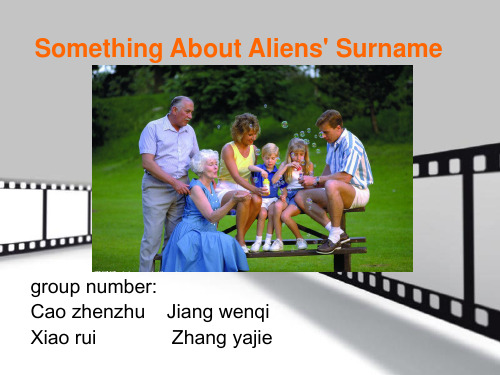
Something About Aliens' Surnamegroup number:Cao zhenzhu Jiang wenqiXiao rui Zhang yajie1.Surname of British•Early man who lived in the United Kingdom were born to just take aname, such as: John or Hilda . Atthat time, people lived together ,they coexistence in the smallvillage, so the name of John orHilda is not easy to be confused.•As the years passed, a smallvillage expanded into large villages,some large village into a town.Thus, there are several people inthe same place with the samename. So how to distinguish thepeople with the same name ?(1)name+profession•The first way is to add the professional name behind the original name.For example,they are two people called John, one is the Weaver (织布工), the other is the cook (厨师). People were called they “John the Weaver”(织布工约翰), John the Cook (厨师约翰).•similiar example later changed intoJohn the Miller(磨坊工约翰)John Miller(约翰·米勒)John the Shepherd(羊倌约翰)John Shepherd(约翰•谢泼德)John the Thatcher(盖屋匠约翰)John Thatcher(约翰•撒切尔)Such second name in English also the surname they used, and soonbe used by they children. for eg: JohnWeaver'schild may be called:Hilda Weaver (希尔达.威弗尔), Charles Weaver(查尔斯.威弗尔)and so on.(2)name + residenceIf two man in the same village both named Tom (汤姆), they can be distinguished according to their habitations, such as: living in a cliff Tom, homes closed to Wood Tom or in the fields Tom .So a series of name after residence appeared.英文姓氏英文字意汉译Wood 树林伍德Field 田地弗尔德Street 街道斯特里特Cliff 悬崖克利夫Tree 树特里Lane 小巷莱恩Bush 灌木丛布什Brook小溪布鲁克Pond池塘庞德Lake湖莱克Forest森林福雷斯特(3)appearance or somebody's son saying A:英文姓氏英文字意汉译Short矮的肖特Brown棕色的布朗Long长的朗Black 黑的布莱克B:This method can be used with the threename Henry:Henry son of John(亨利·约翰之子)Henry son of Robin(亨利·罗宾之子)Henry son of William(亨利·威廉之子)Finally, these names evolved into Johnson(约翰逊), Robinson (罗宾逊), Williamson(威廉逊).2.Surname in AmericaAmerican's given name is very easy,the number of girls' name isless than 500 and the boys' is about 800.However most of these name are copied from<Bible>,such asMary,John,paed withthey name ,it is complicated of their surname .US is a mixed strew of different nation, sodifferent culture,blood and language bringsdifferent surname.Despite five continents, onlythe immigrants of Anglo-Saxon from Britishisles will greatly widen your horizon. If we addup the surname from Japan ,Italy ,Germany ,French ,Arab and so on,there would be morethan 1500,000 surname in US.According to J·N·Hook's research,the big surname over 10000 is more than 3000 in US.the rank of US's ten surname is Smith、Johnson、Williarms、Brown、Jones Miller、Davis、Artinson 、Anderson、Wilson。
[德国球员姓氏趣谈] 姓氏趣谈
![[德国球员姓氏趣谈] 姓氏趣谈](https://img.taocdn.com/s3/m/d4d83bedbb68a98270fefa09.png)
[德国球员姓氏趣谈] 姓氏趣谈[德国球员姓氏趣谈] 姓氏趣谈除了穆勒,另一广泛使用的姓氏要数施密特(Schmidt),这个词来自英文的史密斯(smith)。
其实你也可以把它看成真正的大众化姓氏。
因为其各种各样的变化形式随处可见。
比如施密茨(Schmit2)、施米特(Schmitt)等等,历史上曾经有过六个Schmidt和一个Schmitt为德国队效力,奇怪的是,一个Schmitz都没有。
正如你看到的,就算是一个讲英语的人,也不难在那些最常见的德国名字中分辨出其中的职业属性,织布工(weaver)之于Weber、渔民(isherman)之于Fischer,亦或是牧羊人(shepherd)之于Schafer。
如果你好奇为什么Schneider。
也就是裁缝,在英语中没有类似的对应单词,那是因为古英语中的snithan,代表切、割的意思,现如今已经不再使用。
不过,有时代表某种职业的姓名也会把你引入歧途。
在德国,水盆或者水池被叫做Becken,而动词bauen的意思是建造,那么说贝肯鲍尔(Beckenbauer)的祖先就是一个造水池的工人了?大错特错,以足球皇帝的例子来说,Becken实际是baker(面包师)在德语中的表达,而Bauer,作为名词的意思是农民,因此那个以贝肯鲍尔作为自己家族姓氏的人可能是不得不打了两份工以维持生计,当然这样的日子显然已经过去了。
知道了贝肯鲍尔的故事你可能会好奇施魏因斯泰格(Schweinsteiger)的祖先是干什么的,其名字第一部分的意思是小猪,词干第二部分则来自表示攀爬的动词,虽然这有点可笑,不过别这么早下结论,搞清楚名字背后的含义可是一门科学。
当然还有大胆的猜想。
此外,家族姓氏通常也会跟居住的地点有关,比如保罗・布赖特纳(Paul Breitner)家族姓氏的出处,曾经有人拥有或是住在一片开阔地,breit就是德语中宽阔的意思(想想英语中的broad)。
而Breite则是指一片田地。
中国姓氏和外国姓氏区别英语作文

中国姓氏和外国姓氏区别英语作文The Differences Between Chinese and Foreign SurnamesHi there! My name is Li Xiaoming and I'm 10 years old. Today I want to talk to you about surnames - those family names we all have. I find surnames really interesting, especially the differences between Chinese surnames and surnames from other countries. Let me tell you what I've learned!In China, we have a very old tradition of surnames that goes back thousands of years. Chinese surnames are just a single syllable or character, like Li, Wang, Zhang, Liu and so on. There are not that many commonly used Chinese surnames - probably only a few hundred. But because China has such a huge population, those few hundred surnames get repeated over and over again by many millions of people.The origins of Chinese surnames are really fascinating. Many of them started out as descriptions of jobs, appearances, or locations way back in ancient times. For example, the surname Li originally meant "plum" because an ancestor may have lived near a plum tree or orchard. The surname Zhang meant someone who made pottery or bricks. Isn't that cool?Another unique thing about Chinese surnames is that they are written using Chinese characters rather than an alphabet like English uses. Each surname has a deeper meaning and imagery associated with the character it is written with. Like my surname Li is written as 李which depicts a plum tree or wooden branch. I think that's so neat!Surnames work very differently in Western countries and other parts of the world compared to China. In the West, surnames developed more recently in history after people started using both a first name and a second family name. Western surnames are also often multiple syllables long rather than just one syllable like Chinese names.For example, take the name Michael Johnson. Michael is his first name and Johnson is his surname or family name passed down from his ancestors. Unlike short single-syllable Chinese surnames, Johnson has two syllables - John and son - which originally indicated Michael's ancestors were the "sons of John." Lots of Western surnames started this way as descriptions of family lineages and ancestors.Western surnames can also come from job descriptions like Chinese ones - Miller for a miller who ground grain, Smith for a blacksmith, and so on. But they can also originate fromnicknames, locations, personal traits, and all sorts of other sources that Chinese surnames typically don't.Another big difference is that in English and most Western languages, surnames use the same alphabetic letters as the rest of the language rather than being logographic writing like Chinese characters. So a surname like Johnson has no special imagery or meaning attached to how it is written - it's just the J-O-H-N-S-O-N spelling.I find the variety of Western surnames really fascinating compared to Chinese ones! You have names as short as Hill or Long and ones as crazy long as Llewellyn-Boateng-Chumroo. There are surnames that sound super normal like Walker or Brown, and ones that sound totally wacky to my Chinese ear like Featherstonehaugh or Krzyzewski. What do some of those even mean?!Because Western surnames are so long and varied, there are way, way more unique surnames out there than common Chinese surnames. I read that there are over a million unique surnames just in the United States, compared to only a few hundred common ones in China. That's just mind-boggling to me!One cool similarity though is that in both Chinese and Western cultures, surnames get passed down through family lines - usually from the father's side. So my dad's surname Li got passed to me, and any kids I have would also get the Li surname from me. It's a tradition of family lineage continuity that spans cultures.But in some Western families, I know they blend the parents' surnames together into hyphenated combos, or kids take the mother's surname instead of the father's. You'd never do that with Chinese surnames though - we keep them separate and unchanged through the generations. Our traditions around surnames are bit more rigid in that way.Anyway, those are some of the major differences I've noticed between Chinese surnames and Western ones! Of course, every individual surname has its own unique origin story and meaning behind it. I'd love to learn about more examples from around the world.Surnames are such a core part of our identities, but we hardly ever stop to think about where they came from and what they represent across cultures. At least I find the whole topic really cool and interesting to explore! Let me know if you have any other fun surname facts to share.。
姓氏在英语国家遇到尴尬
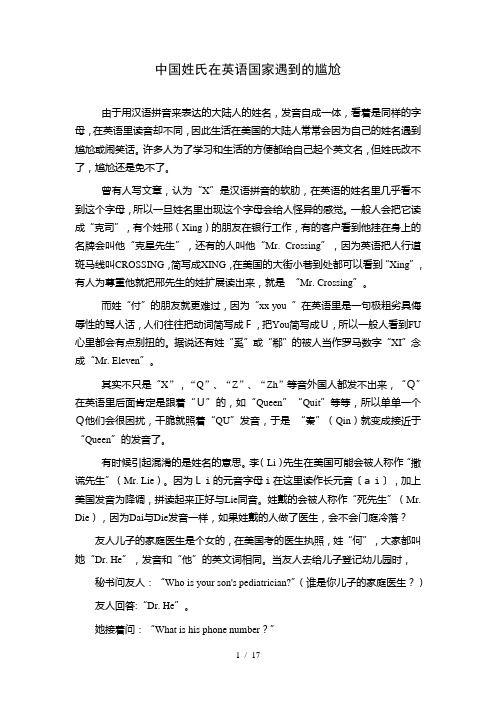
中国姓氏在英语国家遇到的尴尬由于用汉语拼音来表达的大陆人的姓名,发音自成一体,看着是同样的字母,在英语里读音却不同,因此生活在美国的大陆人常常会因为自己的姓名遇到尴尬或闹笑话。
许多人为了学习和生活的方便都给自己起个英文名,但姓氏改不了,尴尬还是免不了。
曾有人写文章,认为‚X‛是汉语拼音的软肋,在英语的姓名里几乎看不到这个字母,所以一旦姓名里出现这个字母会给人怪异的感觉。
一般人会把它读成‚克司‛,有个姓邢(Xing)的朋友在银行工作,有的客户看到他挂在身上的名牌会叫他‚克星先生‛,还有的人叫他‚Mr. Crossing‛,因为英语把人行道斑马线叫CROSSING,简写成XING,在美国的大街小巷到处都可以看到‚Xing‛,有人为尊重他就把邢先生的姓扩展读出来,就是‚Mr. Crossing‛。
而姓‚付‛的朋友就更难过,因为‚xx you‛在英语里是一句极粗劣具侮辱性的骂人话,人们往往把动词简写成F,把You简写成U,所以一般人看到FU 心里都会有点别扭的。
据说还有姓‚奚‛或‚郗‛的被人当作罗马数字‚XI‛念成‚Mr. Eleven‛。
其实不只是‚X”,“Q”、“Z”、“Zh”等音外国人都发不出来,‚Q‛在英语里后面肯定是跟着‚U‛的,如‚Queen‛‚Quit‛等等,所以单单一个Q他们会很困扰,干脆就照着‚QU‛发音,于是‚秦‛(Qin)就变成接近于‚Queen‛的发音了。
有时候引起混淆的是姓名的意思。
李(Li)先生在美国可能会被人称作‚撒谎先生‛(Mr. Lie)。
因为Li的元音字母i在这里读作长元音“ai”,加上美国发音为降调,拼读起来正好与Lie同音。
姓戴的会被人称作‚死先生‛(Mr. Die),因为Dai与Die发音一样,如果姓戴的人做了医生,会不会门庭冷落?友人儿子的家庭医生是个女的,在美国考的医生执照,姓‚何‛,大家都叫她‚Dr. He‛,发音和‚他‛的英文词相同。
当友人去给儿子登记幼儿园时,秘书问友人:‚Who is your son's pediatrician?‛(谁是你儿子的家庭医生?)友人回答:‚Dr. He‛。
最全的英语姓氏的来源和含义
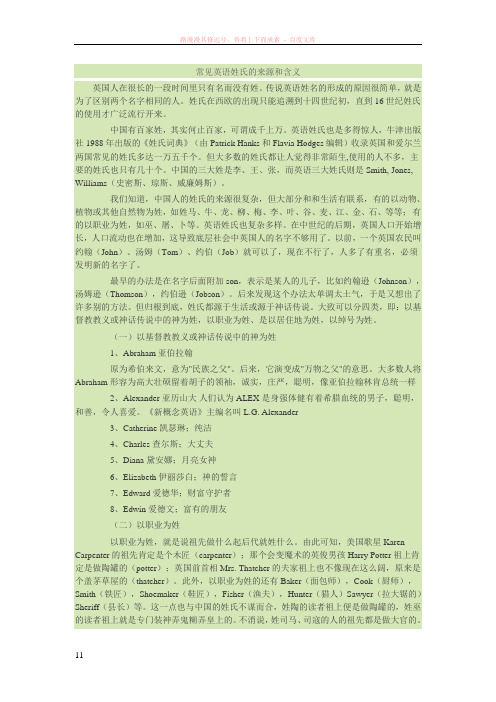
常见英语姓氏的来源和含义英国人在很长的一段时间里只有名而没有姓。
传说英语姓名的形成的原因很简单,就是为了区别两个名字相同的人。
姓氏在西欧的出现只能追溯到十四世纪初,直到16世纪姓氏的使用才广泛流行开来。
中国有百家姓,其实何止百家,可谓成千上万。
英语姓氏也是多得惊人,牛津出版社1988年出版的《姓氏词典》(由Patrick Hanks和Flavia Hodges编辑)收录英国和爱尔兰两国常见的姓氏多达一万五千个。
但大多数的姓氏都让人觉得非常陌生,使用的人不多,主要的姓氏也只有几十个。
中国的三大姓是李、王、张,而英语三大姓氏则是Smith, Jones, Williams(史密斯、琼斯、威廉姆斯)。
我们知道,中国人的姓氏的来源很复杂,但大部分和和生活有联系,有的以动物、植物或其他自然物为姓,如姓马、牛、龙、柳、梅、李、叶、谷、麦、江、金、石、等等;有的以职业为姓,如巫、屠、卜等。
英语姓氏也复杂多样。
在中世纪的后期,英国人口开始增长,人口流动也在增加,这导致底层社会中英国人的名字不够用了。
以前,一个英国农民叫约翰(John)、汤姆(Tom)、约伯(Job)就可以了,现在不行了,人多了有重名,必须发明新的名字了。
最早的办法是在名字后面附加son,表示是某人的儿子,比如约翰逊(Johnson),汤姆逊(Thomson),约伯逊(Jobson)。
后来发现这个办法太单调太土气,于是又想出了许多别的方法。
但归根到底,姓氏都源于生活或源于神话传说。
大致可以分四类,即:以基督教教义或神话传说中的神为姓,以职业为姓、是以居住地为姓,以绰号为姓。
(一)以基督教教义或神话传说中的神为姓1、Abraham亚伯拉翰原为希伯来文,意为"民族之父"。
后来,它演变成"万物之父"的意思。
大多数人将Abraham形容为高大壮硕留着胡子的领袖,诚实,庄严,聪明,像亚伯拉翰林肯总统一样2、Alexander亚历山大人们认为ALEX是身强体健有着希腊血统的男子,聪明,和善,令人喜爱。
最全的英语姓氏的来源和含义分析

常见英语姓氏的来源和含义英国人在很长的一段时间里只有名而没有姓。
传说英语姓名的形成的原因很简单,就是为了区别两个名字相同的人。
姓氏在西欧的出现只能追溯到十四世纪初,直到16世纪姓氏的使用才广泛流行开来。
中国有百家姓,其实何止百家,可谓成千上万。
英语姓氏也是多得惊人,牛津出版社1988年出版的《姓氏词典》(由Patrick Hanks和Flavia Hodges编辑)收录英国和爱尔兰两国常见的姓氏多达一万五千个。
但大多数的姓氏都让人觉得非常陌生,使用的人不多,主要的姓氏也只有几十个。
中国的三大姓是李、王、张,而英语三大姓氏则是Smith, Jones, Williams (史密斯、琼斯、威廉姆斯)。
我们知道,中国人的姓氏的来源很复杂,但大部分和和生活有联系,有的以动物、植物或其他自然物为姓,如姓马、牛、龙、柳、梅、李、叶、谷、麦、江、金、石、等等;有的以职业为姓,如巫、屠、卜等。
英语姓氏也复杂多样。
在中世纪的后期,英国人口开始增长,人口流动也在增加,这导致底层社会中英国人的名字不够用了。
以前,一个英国农民叫约翰(John)、汤姆(Tom)、约伯(Job)就可以了,现在不行了,人多了有重名,必须发明新的名字了。
最早的办法是在名字后面附加son,表示是某人的儿子,比如约翰逊(Johnson),汤姆逊(Thomson),约伯逊(Jobson)。
后来发现这个办法太单调太土气,于是又想出了许多别的方法。
但归根到底,姓氏都源于生活或源于神话传说。
大致可以分四类,即:以基督教教义或神话传说中的神为姓,以职业为姓、是以居住地为姓,以绰号为姓。
(一)以基督教教义或神话传说中的神为姓1、Abraham亚伯拉翰原为希伯来文,意为"民族之父"。
后来,它演变成"万物之父"的意思。
大多数人将Abraham 形容为高大壮硕留着胡子的领袖,诚实,庄严,聪明,像亚伯拉翰林肯总统一样2、Alexander亚历山大人们认为ALEX是身强体健有着希腊血统的男子,聪明,和善,令人喜爱。
外国人姓氏趣谈

外国人的姓氏趣谈一、英国人的姓氏早期居住在英国本土的人,一生下来就只取一个名,如:John(约翰)、Hilda(希尔达)。
当时,人们群居共处,就地扎寨,因人稀寨小,取名John,Hilda的人屈指可数,人们不易混淆。
随着岁月的流逝,小村寨扩展成了大村庄,有些大村庄变成了市镇。
这样,在同一地方就有好几个人取名相同。
那么人们是怎样区别这些同名的人呢?第一个办法就是在原来的名词后面加上本人的职业名称。
譬如两个人都叫John,一个的职业是织布工(the weaver),另一个的职业是厨师(the cook)。
人们就分别叫他们John the Weaver(织布工约翰),John the Cook(厨师约翰)。
类似的例子还有:John the Miller(磨坊工约翰),John the Shepherd(羊倌约翰),John the Thatcher(盖屋匠约翰)。
不久这些叫法就成了:John Weaver(约翰·威弗尔),John Cook(约翰&·库克),John Miller(约翰·米勒),John Shepherd(约翰•谢泼德),John Thatcher(约翰•撒切尔)。
这样英语中的第二个名字即英国人现在用的姓便产生了,而且很快用在小孩的身上。
如:约翰·威弗尔的孩子可能叫做:Hilda Weaver(希尔达·威弗尔),Charles Weaver (查尔斯·威弗尔)等。
古英语中有个名字叫Wright,原意是工人或制造者。
制造两轮马车的人叫cartwright,造车轮子的叫wheelwright、造船的叫shipwright。
英国人至今还使用许多类似Wright(赖特),Cartwright(卡特赖特)和Wainwright(韦恩赖特)的姓。
更为常见的姓是Smith(史密斯)。
英语中的smith一字原意是用金属材料制造东西的人,如:goldsmith(金匠),blacksmith(铁匠),tinsmith(锡匠),coppersmith(铜匠)。
撒切尔是修茅屋的,邦德是奴隶,英国人的姓原来有这些含义
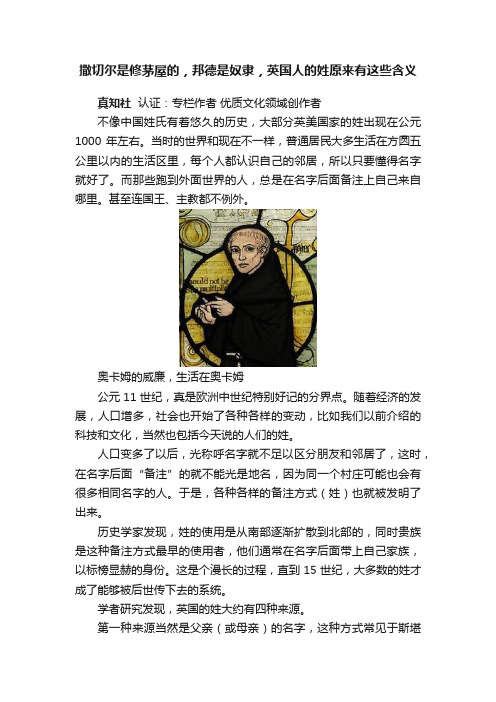
撒切尔是修茅屋的,邦德是奴隶,英国人的姓原来有这些含义真知社认证:专栏作者优质文化领域创作者不像中国姓氏有着悠久的历史,大部分英美国家的姓出现在公元1000年左右。
当时的世界和现在不一样,普通居民大多生活在方圆五公里以内的生活区里,每个人都认识自己的邻居,所以只要懂得名字就好了。
而那些跑到外面世界的人,总是在名字后面备注上自己来自哪里。
甚至连国王、主教都不例外。
奥卡姆的威廉,生活在奥卡姆公元11世纪,真是欧洲中世纪特别好记的分界点。
随着经济的发展,人口增多,社会也开始了各种各样的变动,比如我们以前介绍的科技和文化,当然也包括今天说的人们的姓。
人口变多了以后,光称呼名字就不足以区分朋友和邻居了,这时,在名字后面“备注”的就不能光是地名,因为同一个村庄可能也会有很多相同名字的人。
于是,各种各样的备注方式(姓)也就被发明了出来。
历史学家发现,姓的使用是从南部逐渐扩散到北部的,同时贵族是这种备注方式最早的使用者,他们通常在名字后面带上自己家族,以标榜显赫的身份。
这是个漫长的过程,直到15世纪,大多数的姓才成了能够被后世传下去的系统。
学者研究发现,英国的姓大约有四种来源。
第一种来源当然是父亲(或母亲)的名字,这种方式常见于斯堪的那维亚国家。
通常是给父亲的名字加上前缀或者后缀。
最明显的是加上“son”的后缀,还有盖尔语的“Mac”,诺曼语中的“fitz”和爱尔兰语里的“O”以及威尔士语中的“ap”。
于是,约翰逊是约翰的儿子,麦克唐纳是唐纳德的儿子,菲兹杰拉德是杰拉德的儿子,奥尼尔是尼尔的儿子。
大作家菲兹杰拉德祖上可能是诺曼底人奥尼尔呢……他的养父是爱尔兰来的第二种来源是生活地区的名字。
这也是我们在开篇说到的那种思路。
但在11世纪以后,这种思路有了比较大的延展。
因为它是“法国人”征服者威廉传到英格兰的。
很多贵族跟着威廉从老家搬到陌生的英格兰,于是就用原来生活地方的地理标识来辨别身份。
所以很多英语中的姓都和诺曼底地区的地名有关,可以追溯到他们确切的出生地,不过有一些无从稽考了。
英美姓氏的由来

英语姓名的一般结构为:教名+自取名+姓。
如William Jafferson Clinton。
但在很多场合中间名往往略去不写,如George Bush,而且许多人更喜欢用昵称取代正式教名,如Bill Clinton。
上述教名和中间名又称个人名。
现将英语民族的个人名、昵称和姓氏介绍如下:I. 个人名按照英语民族的习俗,一般在婴儿接受洗礼的时候,由牧师或父母亲朋为其取名,称为教名。
以后本人可以在取用第二个名字,排在教名之后。
英语个人名的来源大致有以下几种情况:1. 采用圣经、希腊罗马神话、古代名人或文学名著中的人名作为教名。
2. 采用祖先的籍贯,山川河流,鸟兽鱼虫,花卉树木等的名称作为教名。
3. 教名的不同异体。
4. 采用(小名)昵称。
5. 用构词技术制造新的教名,如倒序,合并。
6. 将母亲的娘家姓氏作为中间名。
英语民族常用的男子名有:James, John, David, Daniel, Michael, 常见的女子名为:Jane, Mary, Elizabeth, Ann, Sarah, Catherine.II. 昵称昵称包括爱称、略称和小名,是英语民族亲朋好友间常来表示亲切的称呼,是在教名的基础上派生出来的。
通常有如下情况:1. 保留首音节。
如Donald => Don, Timothy => Tim. 如果本名以元音开头,则可派生出以’N’打头的昵称,如:Edward => Ned.2. +ie 或-y 如:Don => Donnie, Tim => Timmy.3. 采用尾音节,如:Anthony => Tony, Beuben => Ben.4. 由一个教名派生出两个昵称,如:Andrew => Andy & Drew.5. 不规则派生法,如:William 的一个昵称是Bill.III. 姓氏英国人在很长的一段时间里只有名而没有姓。
小学英语人教PEP新版四年级上册Unit3英美人姓氏的由来

小学英语人教PEP新版四年级上册
英美人姓氏的由来
英美人的姓名很有意思。
据记载,姓氏的形成有以下几种情况。
1. 以职业为姓。
英语国家中的Carpenter (卡朋特),Thatcher (撒切尔),Tailor (泰勒),Smith (史密斯),Baker (贝克)等姓氏源于木匠、盖屋顶的人、裁缝、铁匠、面包师等职业。
2. 以居住地的城镇或村庄的名称为姓。
如:York 约克,Kent 肯特。
3. 以居住地附近的地表特征为姓。
如:Moor (莫尔),Hill (希尔),Wood (伍德)、等姓氏原是“荒野”,“小山”和“树林”的意思。
4. 以个人特征为姓。
如:Small (斯莫尔),Long (朗),Wise (怀斯) 分别表示“小个子”、“大个子”、“聪明”等身体或个性特征。
5. 有些姓名带有浓厚的宗教色彩。
如;Adam (亚当) 是《圣经》中的人类始祖,John (约翰) 是耶稣的十二门徒之一。
6. 某些姓氏的前面带有Mac/Mc或O’之类的前缀。
如:MacArthur麦克阿瑟 McCarthy麦卡锡,O’Neil 欧尼尔。
前缀Mac或Me说明用该姓氏的人是苏格人的后代,O’表示是爱尔兰人的后代。
7. 有些名字源于外来语。
如:Martinez (马丁内斯),Careia (加西亚)等就来自于西班牙语。
1。
浅谈英语姓氏的起源及含义

作者: 王友贵
出版物刊名: 绵阳师范学院学报
页码: 46-53页
主题词: 英美人 斯堪的纳维亚人 埃格伯特 撒克逊人 家族观念 弗雷 诺曼征服 日尔曼 威廉一世 凯尔特人
摘要: 英美人的姓和名是两个虽有关联,却又完全不同的问题。
本文专门讨论一下英语姓氏的起源及含义,以就教于方家。
一、英语姓氏始于何时 古代英伦三岛的居民,无论是凯尔特人,日尔曼族的盎格鲁——撒克逊人、裘特人,还是北欧的斯堪的纳维亚人,均有名无姓。
这与古代中国人先有姓,继而有氏,最后才有名恰恰相反。
前者虽不无家族的观念,但缺乏姓氏这一坚韧可靠的纽带。
如公元827年统一英格兰七国的西撒克斯国王埃格伯特(Egbert,802—839),英国古代最负盛名的国王艾尔弗雷德大帝(Alfred the Great,871—899)便只有名,没有姓。
事实上,自艾尔弗雷德大帝讫威廉一世征服英国止,英国的15位撒克斯国王尽皆如此。
因此我们可以认为,英国人的家族观念自古以来就没有中国人那样浓强,那样高于自我,高于一切。
有趣的英文姓氏的来历
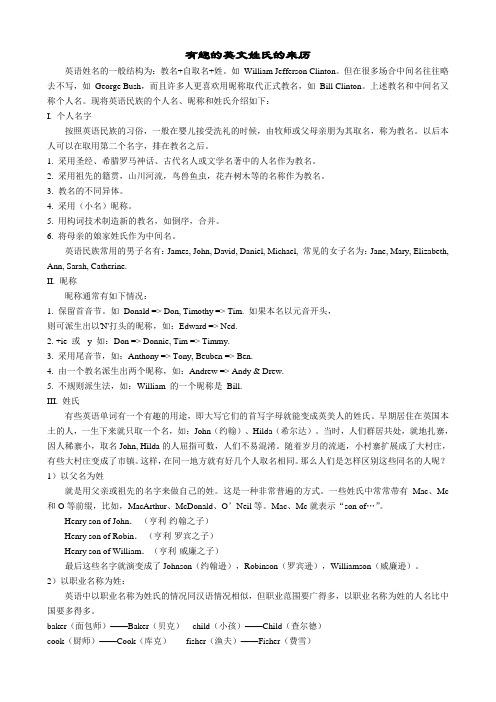
有趣的英文姓氏的来历英语姓名的一般结构为:教名+自取名+姓。
如William Jefferson Clinton。
但在很多场合中间名往往略去不写,如George Bush,而且许多人更喜欢用昵称取代正式教名,如Bill Clinton。
上述教名和中间名又称个人名。
现将英语民族的个人名、昵称和姓氏介绍如下:I. 个人名字按照英语民族的习俗,一般在婴儿接受洗礼的时候,由牧师或父母亲朋为其取名,称为教名。
以后本人可以在取用第二个名字,排在教名之后。
1. 采用圣经、希腊罗马神话、古代名人或文学名著中的人名作为教名。
2. 采用祖先的籍贯,山川河流,鸟兽鱼虫,花卉树木等的名称作为教名。
3. 教名的不同异体。
4. 采用(小名)昵称。
5. 用构词技术制造新的教名,如倒序,合并。
6. 将母亲的娘家姓氏作为中间名。
英语民族常用的男子名有:James, John, David, Daniel, Michael, 常见的女子名为:Jane, Mary, Elizabeth, Ann, Sarah, Catherine.II. 昵称昵称通常有如下情况:1. 保留首音节。
如Donald => Don, Timothy => Tim. 如果本名以元音开头,则可派生出以'N'打头的昵称,如:Edward => Ned.2. +ie 或-y 如:Don => Donnie, Tim => Timmy.3. 采用尾音节,如:Anthony => Tony, Beuben => Ben.4. 由一个教名派生出两个昵称,如:Andrew => Andy & Drew.5. 不规则派生法,如:William 的一个昵称是Bill.III. 姓氏有些英语单词有一个有趣的用途,即大写它们的首写字母就能变成英美人的姓氏。
早期居住在英国本土的人,一生下来就只取一个名,如:John(约翰)、Hilda(希尔达)。
中国姓氏和外国姓氏区别英语作文

中国姓氏和外国姓氏区别英语作文Surnames are So Interesting!Have you ever thought about how cool surnames are? They're like these special words that tell everyone who is part of your family. And get this - not all surnames work the same way around the world! The surnames we use in China are really different from the surnames used in many other countries. Let me explain...In China, we put our surnames (or family names) first, and then our given names after that. So my full name might be something like Wang Xiaoming. Pretty straightforward, right? The "Wang" part is my surname that I share with my parents, grandparents, aunts, uncles, and cousins on my dad's side. The "Xiaoming" part is just my individual name.But in a lot of other countries, they flip it around! Their given name comes first, and then their surname last. So someone named the Chinese way Wang Xiaoming might be Michael Brown in English. Crazy, huh? Can you imagine if we did that in China? I'd be Xiaoming Wang - that just sounds bizarre to me!Another huge difference is how many surnames there are in China compared to other places. We really only have a fewhundred super common surnames here, like Wang, Zhang, Li, Chen, etc. I've probably met at least one person from each of the top 100 most popular surnames.But some of my friends who have moved here from the United States or Europe tell me that in their home countries, there are just sooooo many different surnames used. Thousands upon thousands of them! And a lot of those foreign surnames can be really long and hard to pronounce for us Chinese speakers.I have this one friend from Poland, and I can never say her last name properly. It's something crazy long like Szczsezsschchynski. Who can even fit a name like that on forms and paperwork? Chinese surnames are usually just one syllable, which makes life much easier.Of course, there are some negatives to having such a small number of surnames in China compared to other countries. With so many people sharing the same few hundred last names, it can get really confusing! Lots of people with no family relation at all could have the exact same surname. Just in my class, there are three different Wang students who aren't related whatsoever.But at least Chinese surnames pass down through family lines in a way that makes sense. From what I've learned, things work a bit differently in some other parts of the world.My Canadian friend Luke told me that in his culture, children just automatically get the surname of their father, even if the parents aren't married! And if the parents do divorce, the kids keep the dad's last name no matter what. That seems so bizarre to me.In China, surnames are passed directly from parents to children as a combined family name. So if my dad's surname is Zhang and my mom's is Lin, then their combined surname is Zhang-Lin, which becomes my surname too. Easy as that!Although maybe my favorite difference is how many Chinese surnames actually have meanings that describe the family lineage. Like the surname "Chen" can mean something related to plowing fields or being farmers. Or "Zheng" meaning being truthful and upright people.It's like by knowing someone's surname, you might know a bit about their ancestors' jobs, personalities or histories. My surname "Wang" doesn't have any special meaning that I know of. But my friend Huang's last name means someone who was inthe Yellow Emperor's royal family waaaay back in ancient times! How cool is that?From what I can tell, a lot of foreign surnames are basically just descriptions of people's occupations, locations they're from, or their father's given name squished together. Like "Miller" probably meant someone who worked grinding grain. Or "McDonald" just meant "son of Donald." Not quite as epic as being descended from an emperor's family line!I think overall, Chinese surnames are just simpler and make more sense than a lot of foreign last name traditions. We put the family name first, stick to a small number of common surnames, and they actually have meanings about our ancestry.But I still think it's awesome how different cultures around the world have developed their own totally unique surname systems and name order conventions over the centuries. It's just one more example of how diverse and fascinating all the people of the world can be!Trying to learn about surname customs in every single country would probably take forever. But I've had fun learning about how things work in a few different cultures so far. Who knows, maybe one day I'll master pronouncing my Polish friend's crazy 20-letter last name! Hey, a guy can dream, right?。
- 1、下载文档前请自行甄别文档内容的完整性,平台不提供额外的编辑、内容补充、找答案等附加服务。
- 2、"仅部分预览"的文档,不可在线预览部分如存在完整性等问题,可反馈申请退款(可完整预览的文档不适用该条件!)。
- 3、如文档侵犯您的权益,请联系客服反馈,我们会尽快为您处理(人工客服工作时间:9:00-18:30)。
人文高地Cultural Highlands
英语姓氏之趣谈
张丽萍四川职业技术学院四川遂宁629000
摘要:从英语姓氏的来源分类得知,英语姓氏具有其多样性、繁杂性和趣味性。
了解英语姓氏的相关文化知识可以减少跨文化交际中所存在的障碍。
关键词:英语姓氏;来源;跨文化交际
1引言
姓氏是人类社会发展进化的历史产物,它在人们社会交往、政治生活、经济联系、文化活动、传统习俗等方面均起到很大的作用。
英语姓氏虽然起源迟,但由于西方文化所具备的开放性和自由性,故而英语姓氏也具有其多样性和繁杂性。
同时,也具备了许多的趣味性。
2英语姓氏的形成
姓名的构成与习用是随着历史的演变、社会的发展而逐步形成的。
Anglo-Saxon的姓和名之间没什么区别,是合二为一的。
直到公元3世纪,日耳曼征服以后,名字渐渐有了遗传性或继承性。
世袭的姓首先是从贵族开始的,然后才扩展到平民。
因为起初一些贵族家庭用自己宅邸的名称来称呼一家之长,然后出于家族荣誉感,把它传给子孙,代代相传就变成了姓。
到了公元13-14世纪,姓才逐渐固定下来,但即便在乔叟时代(Chaucer’s Day 1340-1400,人们认为乔叟时代确立了“标准”的书面英语),英语姓名还是有很大弹性,比如人们可能会以主人的名字来称呼这家的佣人、徒弟或主人的儿子,所以,Richards可以指Richard’s man或Richard’s son等。
英语国家的姓氏原本是有含义的,但随着时间的推移,它们原有的含义在历史演变过程中大多失去了原来的意思,变成一种纯粹的姓氏符号[1]。
3英语姓氏的来源分类
英语姓氏来源颇多,可谓是纷繁复杂,丰富多彩。
主要有以下分类:
3.1以祖先所从事的行业名称作为姓氏
相信学习英语的人对Smith这个姓氏非常熟悉,smith的意思是“铁匠”。
2007年美国人口普查局统计了美国人最常用的十大姓氏,Smith位于首位。
除此之外,以职业为姓的还有Baker(面包师),Farmer(农夫),Fisher(渔夫),Cook(厨师),Po rter (搬运工)等。
对于居住在同一个地方的同名的两个人来说,用职业作为姓氏来区分他们是再好不过的了。
比如两人都名叫Bill,一个人的职业是farmer,另一个人的职业是smith,那么就可以分别命名为Bill Farmer和Bill Smith作为区别。
3.2以地形、地貌、环境特征和居住地作为姓氏
一部分英美人喜欢选择地形、地貌、环境特征和居住地等词汇来作为自己的姓氏,如Wo od(树林),Field(田野),Ford(浅滩),Street(街道),Cliff(悬崖),Lane(小巷),Bush(灌木丛),Broo k(小溪),Lake(湖),Fo rest(森林)等。
职业可以用来作为姓氏区分同名的两个人,采用居住地作为姓氏也同样有此效果。
如居住在同一村庄都名为V ictor的两人,一人住在湖边,另一人住在森林里,他们便可取名为V L和V F。
33以颜色作为姓氏
大连理工大学出版社出版的《英语说文解词》指出:充当姓名的颜色词反映出持姓名的祖先偏爱某种颜色借以表达一种意向,或属于某类肤色的人种。
英美国家用颜色作为姓氏的情况较为常见。
如Green(绿色),W hite(白色),Black(黑色),Red (红色),Bro wn(棕色)。
上文提到Smith位于美国十大姓氏之首,而Brow n被列于美国十大姓氏之一。
3.4以动植物的名称作为姓氏
英美人喜欢以自己偏爱的动植物作为姓氏。
比如:Fish(鱼),Wolf(狼),Fox(狐狸),Ro se(玫瑰),Bush(树丛)。
3.5以个人特征和身体部位作为姓氏
每个人都有自己的特点,无论是身体方面还是性格方面,因此就产生了一部分以生理特征和性格特征的词汇作为姓氏的名字。
诸如此类的姓氏有:Lo ng man(高个子),Short(矮的),Armstrong(胳膊强壮的),Hard(吃苦耐劳的),Sharp(精明的)。
更有甚者,直接以身体部位作为姓氏,如Hand(手),Finger(手指),Back(背),Brain(头脑)等。
3.6以城镇名和各类建筑作为姓氏
在英语姓氏中,还有一部分姓氏是来自城镇和建筑的名称。
如Washington(华盛顿),Lo ndon(伦敦),Yo rk(约克),Hall (礼堂),Banks(银行)。
3.7以季节、月份、日期和自然现象作为姓氏
如Summer(夏天),May(五月),D ay(天),Rain(雨)等。
3.8源于父名
以表示血缘关系、承袭关系的词缀构成的词作为姓氏[2],构成方式是父名加前缀或后缀。
前缀Mc-,Mac-,Fitz-,O’-等均表示某某之子或后代,如McLeo d,Fitzw illiam,O’N eil等。
后缀-s,-son,-ing也可用来表示父子关系,如Richards,Wilson,Wilding等。
4结语
姓氏是生命个体的符号标志,又是一种特殊的、超越时空的文化现象[3]。
了解英语姓氏的相关知识,就相当于了解一部分英美文化,能够减少我们在跨文化交际中所面临的障碍。
参考文献:
[1]高永晨,任瑞.中英姓氏差异中的文化蕴涵[J].天津外国语学院学报,2013年第10卷第6期
[2]范正君.从姓氏来源看中英文化异同[J].湘潭大学社会科学学报,2000年6月第24卷第3期
[3]刘青,姓氏中的文化现象解读[]福建论坛(社科教育版),年第6期
/181
ictor ake ictor o rest .
J.
2009
>才智。
